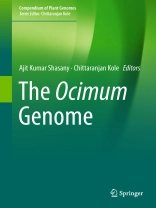This book provides an overview of the Ocimum genus from its genetic diversity to genome sequences, metabolites and their therapeutic utilities. Tulasi, Ocimum tenuiflorum, as a member of the family Lamiaceae, is a sacred plant in India. The plants of this genus Ocimum are collectively referred to as Basil and holy basil is worshipped in the Hindu religion. Basils are reservoirs of diverse terpenoids, phenylpropanoids and flavonoids, in addition to commercially important aromatic essential oils. In 2016, two working groups in India published the genome sequence in two different genotypes of Ocimum tenuiflorum. To help the readers understand the complexities of the genus and different chemotypes, this book accumulates all the available information on this medicinal plant including the genome. The complete knowledge may enable researchers to generate specific chemotypes in basil either through conventional breeding or development of transgenic lines. It also makes it possible to investigate the medicinal nature of holy basil compared to different species of the same genus.
Inhoudsopgave
Genetics of Ocimum.- Systematic position, phylogeny and taxonomic revision of Ocimum.- Genetic manipulation through Mendelian plant breeding and development of genetically improved high yielding varieties of better quality in Ocimum.- Ocimum spp: A longevity elixir.- Triterpene functional genomics in Ocimum.- Genomic resources of Ocimum.- Evolutionary Analysis of few protein superfamilies in Ocimum tenuiflorum.- Holy basil genome sequencing- A futuristic therapeutic mine.- Future prospects.












